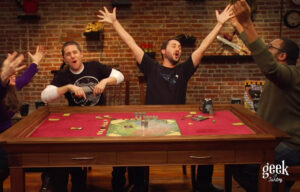Experience Talks, Part I (WT&D Issue 1) discussed the contribution of the GM to a good gaming experience. Part II discusses the role of the players, characters, and campaigns in creating a better gaming experience for everyone.
Good Players
Good Players are essential to any game, especially any role-playing game. A player’s attitude, willingness to adapt, and attentiveness can make the game more enjoyable for everyone involved. Several characteristics that are common to all good players will be addressed in this article. First and foremost is the player’s attitude, from which all their other qualities derive. Other traits that excellent gamers possess include adaptability, attentiveness, and a desire to help out wherever he or she can.
Attitude is the most important trait of good players. People like this are in the game for the story and the fun, not for “experience points.” Good players are more interested in advancing the story and increasing the fun for the group than in advancing their own character. This doesn’t mean that they don’t want their character to succeed and advance in level, but rather that they want their character to take an active part in the story.
Players with a good attitude have fun while playing and show it throughout the game session. Unless you are playing a character that eats nails for breakfast, it’s okay to smile when something good happens. The GM worked hard to make the game fun for everyone – getting into the game and having fun shows appreciation for the GM’s effort. Afterwards, good players thank the GM.
Adapting to the GM’s style helps the game run more smoothly and helps everyone have fun. So if the GM presents the players with a murder mystery, good players will mentally sheathe their swords and adapt their thinking from slayer to sleuth. This is also important in order to prevent conflicts that undoubtedly arise in any particular gaming session. A good player is willing to accept the GM’s rulings, no matter how emphatically they disagree with them and will show a gracious attitude when mistakes are made.
Nothing is more annoying to a GM than when they have to repeat everything that just happened to an inattentive player. Good players pay close attention to what the GM and other players are doing and saying. There should be no need to repeat what the front porch looks like, what the police officer’s name is, what just happened, or what phase it is. Good players show enough respect towards the GM and the other players to listen. When mistakes are made, they point them out carefully.
A game session can last anywhere from a couple of hours to an entire evening or day. Beginning on time shows consideration for everyone involved since leisure time is a luxury for many. Good players show up on time at the right day. Often a player won’t be able to make it to a particular session, but they should always call as far in advance as possible to make sure the GM knows.
If showing up on time is important, then so is being prepared. Good players have their character sheets ready and remember what happened last session. They bring plenty of their own dice, pencils, and paper.
In addition, good players will offer to help the GM wherever they can, whether it’s to help set up for the game, explain rules to new players, or help calculate the STUN and BODY from that 24d6 haymaker. They allow the GM to focus his attention on the matters that need it. Keeping some way of recording what has been happening in the game, whether it’s through an excellent memory, a game diary, or a quote journal, can make keeping up with game events easier for everyone. The GM can do his job better without worrying about refreshing everyone’s memory, and new players can get caught up in the action without requiring the GM’s attention. Although games are meant to be play and not work, good players knows that by doing a little work ahead of time the game can go much more smoothly. An example such a journal can be found on page 11.
Good players are always good guests. Often they bring some drinks or snacks for the group and they always clean up after themselves when the game is over. It is very important to leave the host’s house the way you found it or better.
By practicing the habits outlined above, players can create a better gaming experience and thus make the game more fun for the entire group. Good players help everyone have fun by minimizing the minor annoyances of gaming.

